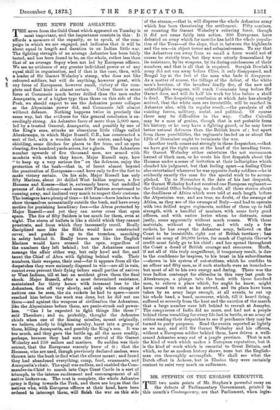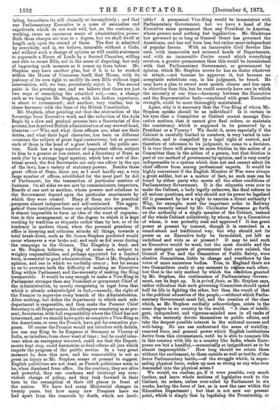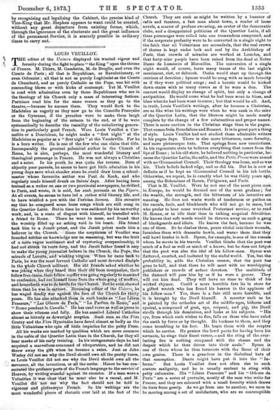MR. STEPHEN ON THE ENGLISH EXECUTIVE.
THE two main points of Mr. Stephen's powerful essay en the defects of Parliamentary Government, printed ha this month's Contemporary, are that Parliament, when legls..
closer harmony with the lines of the British Constitution. Again, why is it necessary that the Vice-King of whom Mr.
Mr. Stephen, after pointing out that the abstraction of the Stephen speaks should be an individual? Is it certain in Sovereign from Executive work, and the reduction of the Aula his eyes that a Committee or Cabinet cannot manage Exe- Regia by a slow and gradual process into a Secretariat of five cutive matters, that it cannot give final orders, or maintain persons, has deprived British administration of any avowed head, the consistency which is supposed to be preserved by a observes :—" Who and what these officers are, what are their President or a Viceroy ? We doubt it, more especially if the duties, and what their legal character, has been on different Cabinet is carefully limited in numbers, is very varied in con- occasions the subject of great legal controversy, but at present stitution, and is compelled by a legal right of control, and each of them is the head of a great branch of the public ser- therefore of reference to its judgment, to come to a decision. vice. Each has a large number of important offices, subject It is true there will always be more friction in the action of a to him to a greater or less extent, and a Secretary of State as Committee than in the action of a person, but that friction is such (for by a strange legal mystery, which has a sort of doc- part of our method of government by opinion, and is very nearly trinal sound, the five Secretaries are only one officer in the eye indispensable to a system which does not and cannot select its of the law), has a variety of statutory powers. Besides these chief officers from among professional experts. It would be ,great offices of State, there are, as I need hardly say, a very highly convenient if the English Minister of War were always • large number of offices, established for the most part by Act a great soldier, but as a matter of fact, no such man can be of Parliament, for the transaction of particular matters of found by either party who meets all the other conditions of business. On all sides we are met by commissioners, inspectors, Parliamentary Government. It is the etiquette even now to Boards of one sort or another, whose powers and relations to make the Cabinet, a body legally unknown, the final referee in the Government depend upon the particular enactments by all serious questions, and why should not its power be legalised which they were created. Many of them are for practical till it possessed by law a right to exercise a direct authority ? ,purposes almost independent and self-contained. The aggre- Why, for example, must the important order to Railway gate of these institutions forms our administrative system." It Boards recently issued by Mr. Chichester Fortescue go forth is almost impossible to form an idea of the want of organisa- on the authority of a single member of the Cabinet, instead tion in this arrangement, or of the degree to which it is kept of the whole Cabinet collectively, by whom, or by a Committee working by tradition or etiquette rather than by law, or of its of whom, it was probably read and approved ? It has great tendency in modern times, when the personal grandeur of power at present by consent, though it is exercised in a office is decaying and criticism attacks all things, towards a round-about and traditional way, but why should, not its total break-down, such as Sir James Stephen predicted would power as an Executive body be formulated, yet left as occur whenever a war broke out, and such as did occur during undefined and wide as at present ? It may be said such the campaign in the Crimea. The Kingship is dead, and an Executive would be weak, but the most durable and the as Mr. Stephen believes, a King of some sort, subject to most stringent agents of government that ever existed, the weighty responsibilities, and perhaps appointed for a limited Council of Ten and the Committee of Public Safety, were term, is essential to good administration. That is Mr. Stephen's elective Committees, liable to change and overthrow by the opinion, and one in which we cordially concur ; but he seems votes of more numerous bodies. True, in England there are to us to overrate both the difficulty of making an Executive two Committees ready at any moment to replace each other, King within Parliament, and the 'necessity of making the King but that is the only method by which the condition granted irremovable. It would be easy enough to make a Vice-King in by Mr. Stephen, the continuance of Parliamentary Govern- Parliament stronger than any President or permanent Chief of ment, can be kept up. It is prime/ facie, as Mr. Stephen says, the Administration, by merely recognising in legal form that rather ridiculous that each governing Committee should spend which is already acknowledged in fact,—namely, the right of half its life in fighting the other, but then the result of that -the Premier to supervise every branch of the Administration, is the political education of the people,—without which Parlia- Alter nothing, but define the department to which each sub- mentary Government must fail, and the creation of the class department is responsible, and then make the Premier Chief which, as Mr. Stephen cordially acknowledges, exists in the Secretary in all Departments, his colleagues remaining as at pre- same degree in no country in the world. "A class of intelli- sent, Secretaries, with full responsibility where the Chief has not gent, independent, and vigorous-minded men in all ranks of intervened, and we should have quite as complete a Vice-King as life, who seriously devote themselves to public affairs, and the Americans, or even the French, have got for executive pur- take the deepest possible interest in the national success and poses. Of course the Premier would not interfere with details, well-being. No one can understand the sense of stability, nor can any King, be he Emperor of Germany or Viceroy of reserved force, and general power which English institutions India, so interfere, from sheer want of time ; but he could inter- derive from this circumstance, until he is able to compare life vene when an emergency occurred, could see that the Depart- in this country with life in a country like India, where Euro- aunts kept step, could harmonise as final referee all jars which peans are but a handful,—numerically so insignificant as to be
impede the progress of the public service. In a very great almost imperceptible." How long should we retain these measure he does this now, and his removability is not so without the excitement, to those outside as well as inside, of the great an injury as Mr. Stephen seems at present to suggest. fierce Parliamentary battle,—of the struggle which, in super- English politicians are not dead, as French politicians seem to seding physical force, wakes up men as strong as any who ever be, when dismissed from office. On the contrary, they are alive descended into the physical arena ?
and powerful, they can condemn and interrupt any over- We would, we confess, go, if it were possible, very much violent change of policy, and they look forward in their further, and leave whole sections of legislative work to the tarn to the resumption of their old places in front of Cabinet, its orders, unless over-ruled by Parliament in six the nation. We have had many Ministerial changes in weeks, having the force of law, as is now the case within the twenty years, but how many new Premiers have we Education Department ; but that is not now our present bad apart from the removals by death, which are inevi- point, which is simply that by legalising the Premiership, or
lating, formulates its will clumsily or incompletely ; and that table ? A permanent Vice-King would be inconsistent with our Parliamentary Executive is a mass of anomalies and Parliamentary Government, but we have a head of the expedients, which do not work well, but, on the contrary, in Executive more permanent than any President in America, working, cause an enormous waste of administrative power. whose powers need nothing but legalisation. Mr. Gladstone Both these charges are true in a degree, but we shall dwell at has governed us as long as General Grant has governed the length only upon the second of them. The first is admitted Americans, and has not been less, but rather more independent by everybody, and is, we believe, incurable without a Code, of popular favour. With an immovable Civil Service like and without such a change of opinion as will enable statesmen ours, 'with immovable and screened heads of Departments, to supersede a House of Lords by a Second Chamber, willing and with an immovable Centre round which everything and able to recast Bills, not in the sense of disputing, but only revolves, a greater permanence than this would be inconsistent of improving each measure as it comes up from below. Mr. with that Parliamentary Government, or government by Stephen may have another plan, but if it is to be worked opinion, which Mr. Stephen avows he has no desire whatever within the House of Commons itself, that House, with its to attack,—not because he approves it, but because no jealousy of its own right to modify its own Bills without legal acceptable substitute can, in his judgment, be found. He intervention, will, we fear, persistently reject it. The second may have a plan to reveal next month clearer and less open point is the pressing one, and we believe that there are just to objection than this, but he could scarcely have one in which two ways of remedying the admitted evil,—one, a change the necessity of our time—harmony between the Executive such as we imagine Mr. Stephen, with his Indian experience, and the Representative body—combined with great Executive is about to recommend and another, very similar, but in strength, could be more thoroughly maintained. by recognising and legalising the Cabinet, the precise kind of Vice-King that Mr. Stephen appears to want could be created, without any great departure from existing forms, which, through the ignorance of the electorate and the great influence of the permanent Service, it is scarcely possible in ordinary times to carry out.








































 Previous page
Previous page